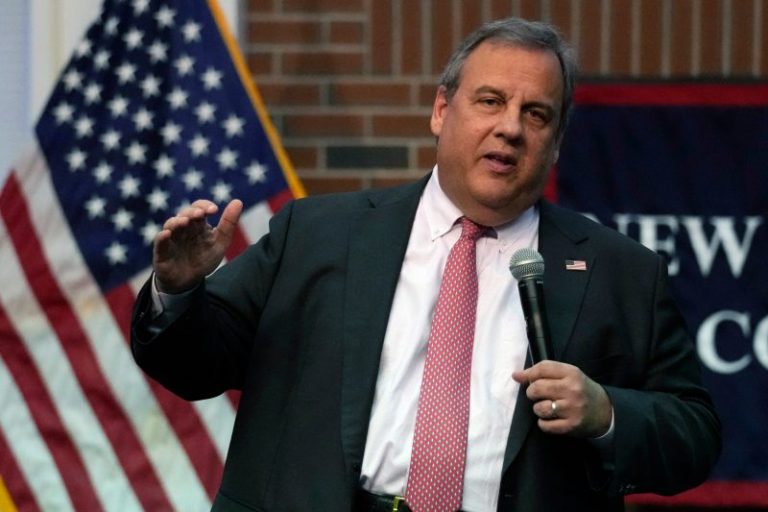Longtime advisers to Chris Christie have formed a super PAC to support his expected presidential bid as the former New Jersey governor prepares to directly take on Donald Trump in the race for the GOP nomination.
Christie, a former U.S. attorney who is one of the GOP’s most vociferous critics of the former president, has been exploring a presidential bid for months, expressing his frustration that Trump’s current and potential Republican rivals — including Florida Gov. Ron DeSantis, former U.N. ambassador Nikki Haley and former vice president Mike Pence — have largely avoided confronting Trump directly.
The formation of the outside group, Tell It Like It Is, is being led by Brian Jones, who was an adviser to the presidential bids of John McCain and Mitt Romney, and is being chaired by Bill Palatucci, a Republican national committeeman from New Jersey and Christie confidant. Super PACs, which can raise and spend unlimited funds but can’t directly coordinate expenditures with candidates, have become commonplace in GOP presidential primaries as operatives look for ways to marshal support from donors.
Christie and his allies have concluded that the only way to win the nomination is to go directly “through Trump,” according to people familiar with his thinking, and he is eager to get on the debate stage to prosecute the case against Trump’s unfulfilled promises — including his pledge to repeal Obamacare and his vow to build a wall along 2,000 miles of the U.S. southern border and make Mexico pay for it. The people spoke on the condition of anonymity to describe strategy.
During a recent town hall in New Hampshire, Christie called Trump “a failure on policy and a failure on character,” asserting that he is nothing more than a TV star.
“Everybody can be fooled once by a shuckster, by a TV star,” Christie said. “But if we allow ourselves to be fooled twice, we have no one to blame but ourselves. And let me promise you, if he is the nominee in 2024, Joe Biden will be the president in 2025.”
While DeSantis has emerged in opinion polls as the clear second-place contender against Trump, Christie’s allies believe that a large swath of the GOP electorate is still looking for someone else and that the support for DeSantis is soft, particularly after the Florida governor emerged as a less agile candidate than some in the party had expected.
The formation of Tell It Like It Is was first reported by the New York Times. Also advising the group will be Russ Schriefer, who has shaped campaign messaging for Romney, George W. Bush, and former Maryland governor Larry Hogan, among others; and Brent Seaborn, who specializes in campaign data and will focus on targeting voters.
Christie’s path is likely to hinge on a strong finish in the early primary state of New Hampshire, where he is well known and has spent a great deal of time — and that serves as a slingshot of momentum into the states that follow. But his allies believe that his aggressive approach toward Trump would garner attention across the country, drawing in voters who are exhausted by the former president’s persona and fearful that his polarizing approach could lead to a loss against Biden.
One of Christie’s greatest challenges will be explaining his own complicated relationship with Trump. He emerged as a major Trump critic in the 2016 Republican primary, but then became a prominent adviser who briefly ran Trump’s 2016 transition team before being ousted. After the Jan. 6, 2021, attack on the Capitol, he became a fierce critic of Trump’s false claims about the 2020 election, as well as his treatment of Pence on Jan. 6.
As he has addressed voters in recent months, Christie has noted that he chaired Trump’s Opioid and Drug Abuse Commission and said he did everything he could “to try to make him the best president he can ever be.”
“You’re not hearing from some ‘Never Trumper’ who is against him from minute one that feels vindicated,” Christie told the New Hampshire audience in April. He described himself as someone who believed he could “help make him better and wanted him to do what was best for the country.”
“He failed me even worse than he failed you. So I’m not going to stand around and let this happen,” he said.

